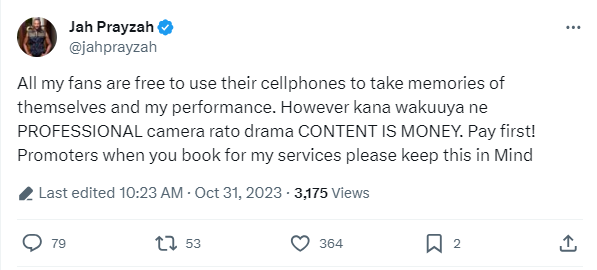Jah Prayzah, one of Zimbabwe’s biggest musicians has sparked debate by announcing a ban on professional cameras at his live shows. The artist stated that while fans can freely use their phones, professional cameras will be prohibited without payment.
In a tweet, the musician explained “All my fans are free to use their celephones to take memories of themselves and my performance. However kana wakuuya ne PROFESSIONAL camera rato drama CONTENT IS MONEY. Pay first!”
He called on promoters to enforce this policy when booking his services. The tweet quickly gained attention, dividing opinions on whether prohibiting pro cameras is reasonable.

On one side, the artist argues that professional concert footage represents valuable content that deserves compensation. In the digital age, live performances can be quickly disseminated online to huge audiences. The musician believes high-quality multi-camera shoots of his shows should require licensing fees.
However, critics counter that banning professional cameras takes things too far. They contend that sharing user-generated content helps artists by spreading hype and awareness. Preventing fans from filming with their equipment dampens the live experience and grassroots promotion.
Nonetheless, unauthorized pro-shot concert videos do enable freebooting that costs artists revenue. The rise of illegal streaming makes unauthorized distribution of live performances a growing concern.
The musician’s controversial camera ban represents the latest attempt by artists to control their intellectual property in the digital era. From Beyonce confiscating phones to disability singing holograms, stars are experimenting with new rules to protect their content.
But corralling user behavior frequently courts backlash. Overly strict policing of fans threatens to tarnish artist-audience relationships. Where to draw the line remains hotly debated as technology evolves.
While seeking fair compensation, the musician must weigh the PR optics of restricting fans. A heavy-handed approach risks alienating his supporter base. A more nuanced policy could address unauthorized distribution while respecting audience members.
As digital disruption continues reshaping the music landscape, expect vigorous debate on balancing artist rights with fan freedoms to rage on. This latest camera ban marks one flashpoint in the ongoing struggle to align technology, IP and creative arts.
Read more:
- Sam’s Club reshapes retail landscape with storewide digital transformation
- Target goes green, challenges Walmart with innovative paper wine bottles
- CAG Travellers: Weaving journeys of trust and luxury across Zimbabwe
- Zimbabwe’s Fastjet Operates Inaugural Flight
- TN Cybertech Bank: A Risky Rebrand for Steward Bank Zimbabwe?





